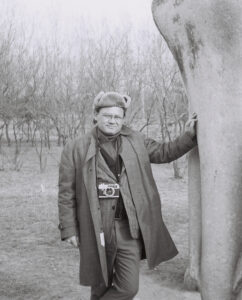Remembering Roger Blobaum:
A Pioneer, Leader, and Historian of the Organic Movement (1929-2023)
,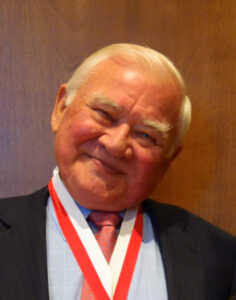 Roger Blobaum, a visionary and trailblazer in the organic farming world, left an indelible mark on the agricultural landscape. His remarkable contributions encompassed a deep commitment to organic practices and advocacy. In this tribute, we celebrate the life and legacy of Roger, whose passion and dedication continue to inspire. As well as the essence of Roger. He was a loyal, passionate, precious friend and mentor to so many in the organic community.
Roger Blobaum, a visionary and trailblazer in the organic farming world, left an indelible mark on the agricultural landscape. His remarkable contributions encompassed a deep commitment to organic practices and advocacy. In this tribute, we celebrate the life and legacy of Roger, whose passion and dedication continue to inspire. As well as the essence of Roger. He was a loyal, passionate, precious friend and mentor to so many in the organic community.
A Pivotal Moment: In 1971, Roger Blobaum experienced a transformative moment that defined his life's purpose. His visit to Clarence Van Sant's organic farm in Grinnell, Iowa, left an enduring impression. Witnessing the vibrancy of the soil, crops, and livestock at this farm inspired him to embark on a lifelong journey as an agricultural consultant, activist, and leader in organic farming research, education, advocacy, and policymaking. Little did he know that this moment would set the stage for a remarkable legacy, preserved in the historical archive of the Roger Blobaum Organic History Website.
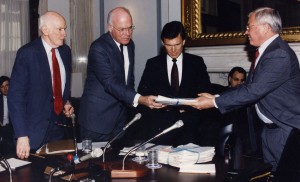
Roger Blobaum (far right), director of Americans for Safe Food Initiative, presenting signatures of 136,000 consumers who supported the 1990 Organic Production Act Bill to Senator Patrick Leahy.
Roots of Awareness: Roger often attributed his connection to nature and organic principles to his childhood in southern Iowa during the Great Depression. Growing up on a diverse crop and livestock farm, he learned the value of the natural environment and the interdependence of all living beings. His upbringing instilled in him a profound respect for the earth and its resources.
A Life Enriched by Diverse Experiences: With academic qualifications in journalism, mass communication, and dispute resolution, Roger's career encompassed a wide range of experiences. From his days as an Associated Press political reporter to serving as a press secretary and legislative assistant for Senator Gaylord Nelson where he wrote the first DDT ban bill, to interviewing, photographing, and writing about Midwest organic farmers in the 1970s for Rodale publications, Roger played a pivotal role in shaping the landscape of environmental policy. His extensive travels, such as his visit to Chinese collectives during the Cultural Revolution, allowed him to witness millennium-old regenerative agricultural practices that further fueled his passion for sustainability.
Champion of Non-Profit Organizations: Roger was a tireless advocate for non-profit organizations, contributing his expertise to over thirty regional, national, and international organic and sustainable agriculture organizations. His fourteen-year tenure on the Midwest Organic and Sustainable Education Service (MOSES, now Marbleseed) board highlights his dedication to mentoring and nurturing new leaders.
Environmental Stewardship: Roger's work extended beyond domestic boundaries. He played a pivotal role in the International Organic Accreditation Services, served on the USDA's National Sustainable Agriculture Advisory Council, and was a founder and associate director of the World Sustainable Agriculture Association. His involvement in the Codex Alimentarius Food Labeling Committee allowed him to influence the development of international organic guidelines.
A Heart Rooted in the Midwest: Despite his extensive travels and contributions on a global scale, Roger's heart remained in the Midwest. His vision for MOSES Organic University, the Farmer-To-Farmer Mentoring Program, and the Organic Farmer of the Year Award all had their origins in the heartland.
A Legacy of Organic Research: Roger's impact extended to research as well. He played a pivotal role in developing and coordinating Ceres Trust programs that has awarded over $6 million in grants to land-grant university faculty and graduate student researchers.
Honorary Recognition: In 2013, Roger received the Honorary Recognition Award from the University of Wisconsin-Madison College of Agricultural and Life Sciences, recognizing his lifetime contributions to sustainable agriculture.
A Historian's Legacy: Roger Blobaum was not only a pioneer but also a dedicated historian. Over the course of four decades, he diligently collected documents and materials from more than thirty-five state, regional, national, and international organizations, preserving the history of organic agriculture. The Wisconsin Historical Society Organic and Sustainable Agriculture Collection, established in 2012 with the support of the Ceres Trust, now houses Roger's collection and is accessible to the public.
The Roger Blobaum Organic History Website: Roger’s website offers a curated selection of documents from his extensive collection. We invite you to visit the website to explore the history of the organic movement, learn more about Roger's life, and share your memories and comments on his legacy.
Continuing Roger's Legacy: Roger Blobaum's life was a testament to the strength of one individual's passion and dedication to creating a better, more sustainable world. His influence on the organic movement and his unwavering commitment to environmental stewardship continue to inspire and guide us. Roger's legacy is a reminder that we all have the capacity to make a lasting impact on the world, just as he did.
Awards and Media
2013 Honorary Recognition Award University of Wisconsin-Madison College of Agricultural and Life Sciences
These are the highest honors bestowed by CALS. The Honorary Recognition Award, established in 1909, recognizes individuals who have made significant contributions to their professions, their communities and the university.
Roger Blobaum, an agricultural consultant, has been a leader in organic farming research, education, advocacy and policymaking since the early 1970s. He has served on boards of more than 30 regional, national and international organic and sustainable agriculture organizations, including Midwest Organic and Sustainable Education Service (MOSES). His contribution to MOSES includes developing the Organic University, which provides short courses to more than 500 participants annually, and the MOSES farmer-to-farmer mentoring program. He was a founding director of the International Organic Accreditation Service, a founder and associate director of the World Sustainable Agriculture Association, and a participant in the 5-year process of setting international organic guidelines. He co-chaired a coalition of national organizations that helped shape the 1990 Organic Foods Production Act and that successfully advocated its enactment. His organic research contributions include developing and coordinating Ceres Trust programs that have awarded more than $6 million in grants to land grant university faculty and graduate student researchers.
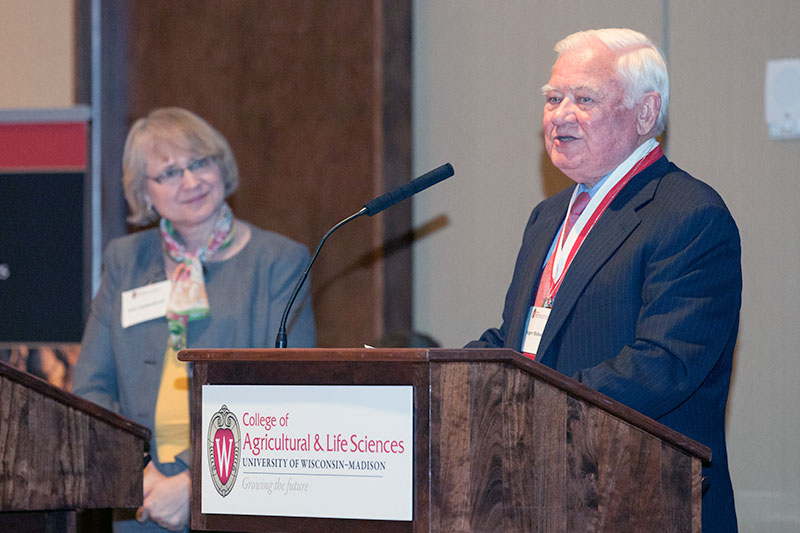
25 People Who Influenced the Organics Industry - Natural Foods Merchandiser Magazine
October 1, 2004
Vicky Uhland, Lynn Ginsburg, Hilary Oliver
At its most elemental level, the word “organic” means “alive.” The following people, through their vision, sweat, passion and persistence, brought life to the organics industry. They have dedicated their lives to improving ours, and they are alive with the spirit of organics.
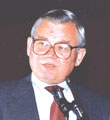 Roger Blobaum
Roger Blobaum
President of Blobaum & Associates, a Washington, D.C.-based natural products consulting firm.
Years in the industry: 32. Blobaum began as an editorial consultant to Rodale Press and spent six years on the organic steering committee of the National Campaign for Sustainable Agriculture. He’s been a board member of the International Organic Accreditation Service, the Organic Farming Research Foundation, the Michael Fields Agricultural Institute and the Organic Alliance.
How have you influenced the organics industry? “My attempts … have focused on broadening the base of the organic community by mobilizing support for organic food and farming by consumer, environmental, animal protection and other public interest sectors. The combination of organic farmers and the organic industry is still a tiny economic sector, [which] needs allies to be effective in the political and regulatory arenas, and lacks the resources and political clout to go it alone.”
Do you think the mainstreaming of organics has been good for the industry? “For the most part, [it’s] a necessary and positive development. This seems obvious when the number of certified organic farmers, after 40 years of development, is still less than 9,000; only 0.3 percent of U.S. crop and pasture land is under organic management; and organics sales account for less than 1 percent of what consumers spend for food. Mainstreaming will assure organic sector growth in the long run, however, only if it can be accomplished without compromising organic integrity, failing to meet consumer expectations, eroding public confidence in the organic label, or making marketing claims that cannot be verified.”
What do you think is the future of organic regulations? “Overall, I believe [they] will become increasingly politicized and globalized and that the influence of organic farmers, independent organic companies, consumers, environmentalists and animal protection advocates will be diminished. We see this already in the performance of the National Organic Program, which is undermining public confidence in the government-based regulatory/enforcement approach and is raising serious concerns about the ability of government regulators to guarantee organic integrity. Legislation to update and improve the 1990 Organic Foods Production Act would appear to be an obvious solution. But this has been resisted due to mistrust of the political system that would be called on to change the law. Trends [such as erosion of farmer and consumer input and disappearance of pioneer organic companies through mergers and acquisitions by international food companies] will be exacerbated if the outdated and flawed organic law remains unchanged and current attempts to weaken international organic norms and diminish the influence of private certification and accreditation alternatives continue.”
What do you think will be the next hot category in the organic marketplace? Will any category or product fade? “If the growing trend toward factory-farm practices on organic farms can be reversed, I believe the marketing of organically produced meat, milk and other livestock products is a huge, unrealized … opportunity.”

